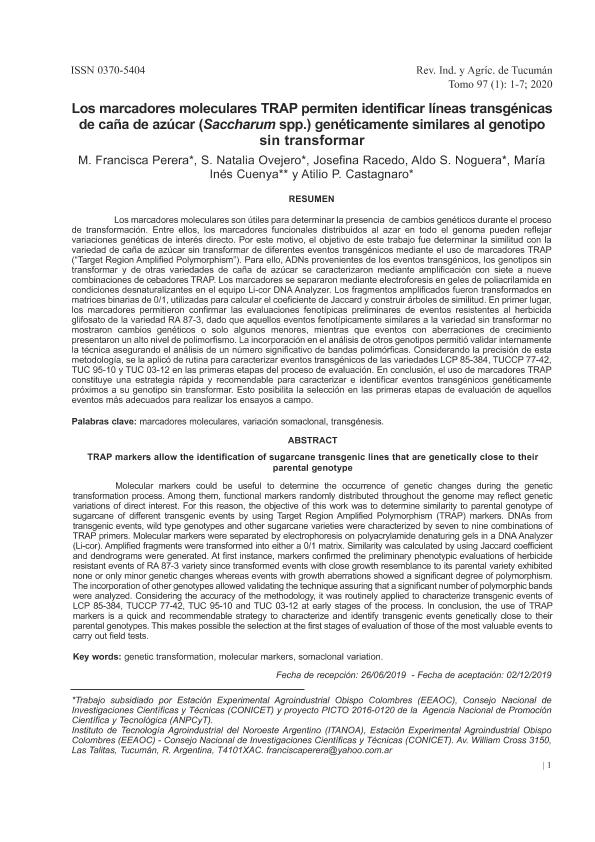Artículo
Los marcadores moleculares son útiles para determinar la presencia de cambios genéticos durante el proceso de transformación. Entre ellos, los marcadores funcionales distribuidos al azar en todo el genoma pueden reflejar variaciones genéticas de interés directo. Por este motivo, el objetivo de este trabajo fue determinar la similitud con la variedad de caña de azúcar sin transformar de diferentes eventos transgénicos mediante el uso de marcadores TRAP (“Target Region Amplified Polymorphism”). Para ello, ADNs provenientes de los eventos transgénicos, los genotipos sin transformar y de otras variedades de caña de azúcar se caracterizaron mediante amplificación con siete a nueve combinaciones de cebadores TRAP. Los marcadores se separaron mediante electroforesis en geles de poliacrilamida en condiciones desnaturalizantes en el equipo Li-cor DNA Analyzer. Los fragmentos amplificados fueron transformados en matrices binarias de 0/1, utilizadas para calcular el coeficiente de Jaccard y construir árboles de similitud. En primer lugar, los marcadores permitieron confirmar las evaluaciones fenotípicas preliminares de eventos resistentes al herbicida glifosato de la variedad RA 87-3, dado que aquellos eventos fenotípicamente similares a la variedad sin transformar no mostraron cambios genéticos o solo algunos menores, mientras que eventos con aberraciones de crecimiento presentaron un alto nivel de polimorfismo. La incorporación en el análisis de otros genotipos permitió validar internamente la técnica asegurando el análisis de un número significativo de bandas polimórficas. Considerando la precisión de esta metodología, se la aplicó de rutina para caracterizar eventos transgénicos de las variedades LCP 85-384, TUCCP 77-42, TUC 95-10 y TUC 03-12 en las primeras etapas del proceso de evaluación. En conclusión, el uso de marcadores TRAP constituye una estrategia rápida y recomendable para caracterizar e identificar eventos transgénicos genéticamente próximos a su genotipo sin transformar. Esto posibilita la selección en las primeras etapas de evaluación de aquellos eventos más adecuados para realizar los ensayos a campo. Molecular markers could be useful to determine the occurrence of genetic changes during the genetic transformation process. Among them, functional markers randomly distributed throughout the genome may reflect genetic variations of direct interest. For this reason, the objective of this work was to determine similarity to parental genotype of sugarcane of different transgenic events by using Target Region Amplified Polymorphism (TRAP) markers. DNAs from transgenic events, wild type genotypes and other sugarcane varieties were characterized by seven to nine combinations of TRAP primers. Molecular markers were separated by electrophoresis on polyacrylamide denaturing gels in a DNA Analyzer (Li-cor). Amplified fragments were transformed into either a 0/1 matrix. Similarity was calculated by using Jaccard coefficient and dendrograms were generated. At first instance, markers confirmed the preliminary phenotypic evaluations of herbicide resistant events of RA 87-3 variety since transformed events with close growth resemblance to its parental variety exhibited none or only minor genetic changes whereas events with growth aberrations showed a significant degree of polymorphism. The incorporation of other genotypes allowed validating the technique assuring that a significant number of polymorphic bands were analyzed. Considering the accuracy of the methodology, it was routinely applied to characterize transgenic events of LCP 85-384, TUCCP 77-42, TUC 95-10 and TUC 03-12 at early stages of the process. In conclusion, the use of TRAP markers is a quick and recommendable strategy to characterize and identify transgenic events genetically close to their parental genotypes. This makes possible the selection at the first stages of evaluation of those of the most valuable events to carry out field tests.
Los marcadores moleculares TRAP permiten identificar líneas transgénicas de caña de azúcar (Saccharum spp.) genéticamente similares al genotipo sin transformar
Título:
TRAP markers allow the identification of sugarcane transgenic lines that are genetically close to their parental genotype
Perera, María Francisca ; Ovejero, Silvia Natalia; Racedo, Josefina
; Ovejero, Silvia Natalia; Racedo, Josefina ; Noguera, Aldo Sergio; Cuenya, María Inés
; Noguera, Aldo Sergio; Cuenya, María Inés ; Castagnaro, Atilio Pedro
; Castagnaro, Atilio Pedro
 ; Ovejero, Silvia Natalia; Racedo, Josefina
; Ovejero, Silvia Natalia; Racedo, Josefina ; Noguera, Aldo Sergio; Cuenya, María Inés
; Noguera, Aldo Sergio; Cuenya, María Inés ; Castagnaro, Atilio Pedro
; Castagnaro, Atilio Pedro
Fecha de publicación:
01/2020
Editorial:
Estación Experimental Agroindustrial Obispo Colombres
Revista:
Revista Industrial y Agrícola de Tucumán
ISSN:
0370-5404
Idioma:
Español
Tipo de recurso:
Artículo publicado
Clasificación temática:
Resumen
Palabras clave:
MARCADORES MOLECULARES
,
VARIACION SOMACLONAL
,
TRANSGENESIS
Archivos asociados
Licencia
Identificadores
Colecciones
Articulos(CCT - NOA SUR)
Articulos de CTRO.CIENTIFICO TECNOL.CONICET - NOA SUR
Articulos de CTRO.CIENTIFICO TECNOL.CONICET - NOA SUR
Articulos(ITA-NOA)
Articulos de INST. DE TECNOLOG. AGROINDUST. DEL NOROESTE ARGENTINO
Articulos de INST. DE TECNOLOG. AGROINDUST. DEL NOROESTE ARGENTINO
Citación
Perera, María Francisca; Ovejero, Silvia Natalia; Racedo, Josefina; Noguera, Aldo Sergio; Cuenya, María Inés; et al.; Los marcadores moleculares TRAP permiten identificar líneas transgénicas de caña de azúcar (Saccharum spp.) genéticamente similares al genotipo sin transformar; Estación Experimental Agroindustrial Obispo Colombres; Revista Industrial y Agrícola de Tucumán; 97; 1; 1-2020; 1-7
Compartir



